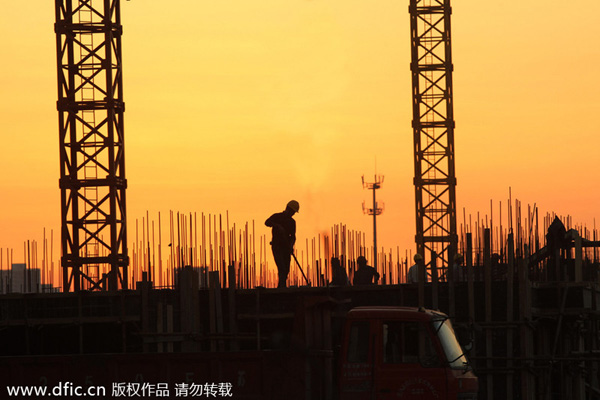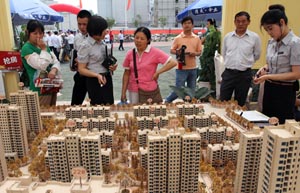Home prices continue to fall in more cities
Updated: 2014-07-18 10:37
(Xinhua)
|
|||||||||||
 |
|
A home project is under construction in Nantong, Jiangsu province, Oct 13, 2013. [Photo/IC] |
BEIJING - China's home prices continued a downward trend in more cities in June, pointing to a sluggish property market that is complicating the broader economy as growth falters, official data showed on Friday.
New home prices in 55 of a sample of 70 major cities showed month-on-month drops in June, compared with 35 in May, the National Bureau of Statistics (NBS) said in a statement.
Only eight cities, including Beijing, saw month-on-month gains, down from 15 in May.
Data showed the average home price in these 70 cities slipped 0.47 percent from the previous month, marking a second consecutive monthly drop following a 0.15 percent fall in May.
Fifty-two cities saw price drops for existing homes in June.
However, on a year-on-year basis, new home prices in most cities are still higher than a year ago, with only Wenzhou City seeing a price drop in June.
The data added to signs that the property market is experiencing what analysts called an "adjustment period" after torrid growth in previous years. Earlier NBS data showed property sales volume was down by 6.7 percent year on year during the January-June period, compared with a 5.9-percent drop in the first five months, while total area of property sales dropped 6 percent year on year in the first half of the year.
Seeing no signs of warming in the market, many local governments have started to adjust their policies to boost sales.
Last week, the eastern Chinese city of Jinan became the latest region to lift home purchase restrictions. So far, around 20 regions, mostly second- and third-tier cities where inventories are high, have lifted or eased restrictions on home purchases that were imposed in early 2011 as a tool to cool the market.
Unlike the previous easing measures, which usually led to a rebound in the market, this round of loosening seems to have had little impact as expectations of further price drops remain.
Zhuang Jian, senior economist with Asian Development Bank, said the recent adjustment came because previous rises have reached the limit, and the price easing trend will last for a while.
Chen Sheng, executive director of China Real Estate Data Academy in Shanghai, agreed. "Inventory pressure in first-tier cities is relatively low and the housing market will likely recover in the latter half of next year. But second- and third-tier cities will face a longer adjustment period," he noted.
The slowdown in the property market came amid subdued strength in the broader economy, bringing challenges to policymakers as the housing market has been an important growth engine for China.
China's growth accelerated to 7.5 percent in the second quarter of 2014 after dipping to 7.4 percent in the first quarter, the latest NBS data showed. But economists warned that renewed setbacks may come from the property downturn.
While admitting the cooling housing market would be a drag on growth, Zhuang said China's pledge to increase investment in infrastructure, railways and affordable housing will help offset the impact.
In the long run, the gradual deflation of the property bubble will help foster a healthier and steadier market that will benefit future growth, he added.
|
 |
 |
| China's H1 property investment growth slows | Realty heading for market consolidation |
Related Stories
China's growth shows more signs of stabilizing: economists 2014-07-17 16:32
Chilling house market cools land sales 2014-07-17 09:41
Realty investment growth slows 2014-07-17 07:17
China growth data to show stimulus kicking in but more support may be needed 2014-07-16 07:33
Woman sells Beijing house, buys six properties in US 2014-07-11 15:35
China's H1 growth up 7.4%, showing economic resilience 2014-07-17 09:35
Today's Top News
Burning wreckage, bodies scattered after jet downed
Xi makes plea for 'cyperpeace'
China's GDP growth 'in range'
Israeli forces roll into Gaza
US widens sanctions on Russia over Ukraine
Hamas agrees on 5-hr ceasefire
Chinese killed in Moscow metro derailment
Obama vows info co-op to Merkel
Hot Topics
Lunar probe , China growth forecasts, Emission rules get tougher, China seen through 'colored lens', International board,
Editor's Picks

|

|

|

|

|

|





